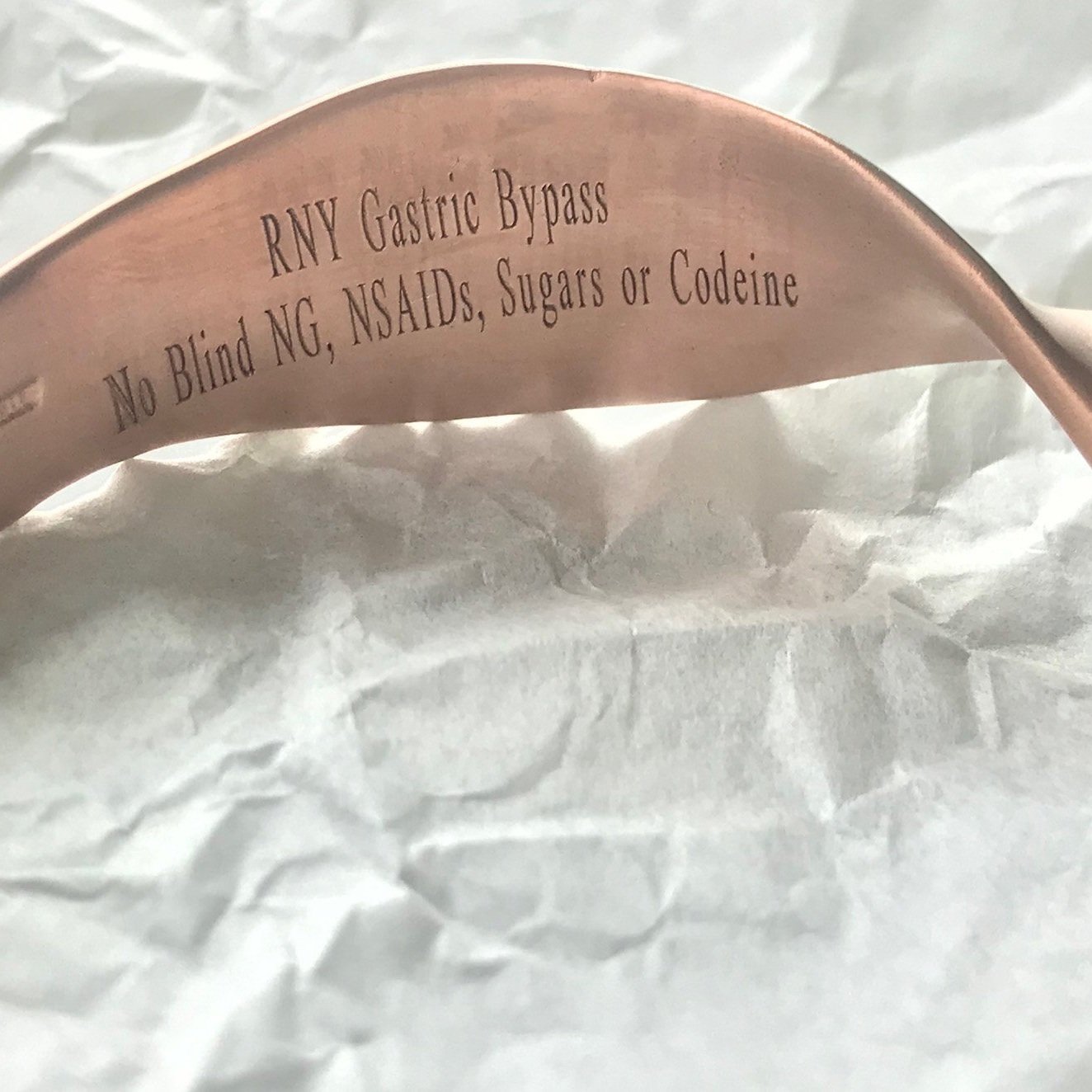Weight Loss Surgery Bracelets
Weight loss surgery is a procedure performed on individuals who have been unsuccessful in losing weight through traditional methods such as diet and exercise. It is usually recommended for individuals with a body mass index (BMI) greater than 40 or those with a BMI greater than 35 with obesity-related health problems such as diabetes or hypertension. In this article, we will discuss the different types of weight loss surgeries, how they work, their risks and side effects, why one might be prescribed them, and why it is crucial to wear a medical ID if you have had weight loss surgery.
Why You Should Wear a Medical ID if You’ve Had Weight Loss Surgery
Regardless of the type of weight loss surgery, wearing a medical ID bracelet is important for individuals who have undergone the procedure. A medical ID bracelet is a piece of jewelry that contains important medical information about the wearer, including their medical conditions, medications, allergies, and emergency contacts. Wearing a medical ID bracelet can provide crucial information to medical professionals in an emergency, allowing them to provide prompt and appropriate care.
Wearing a medical id bracelet after weight loss surgery can provide important information about your health status to medical professionals in case of an emergency.
Weight loss surgery can lead to significant changes in your body, and medical professionals need to be aware of your surgery and its potential complications to provide the best care possible.
The risk of developing complications after weight loss surgery, such as malnutrition, dehydration, and dumping syndrome, can be increased if medical professionals are not aware of your surgery. (Dumping syndrome is a condition that can occur after weight loss surgery where food moves too quickly through the stomach and into the small intestine.)
In the case of an emergency, wearing a medical id bracelet can help medical professionals quickly identify your condition, provide appropriate treatment, and potentially save your life.
Wearing a medical id bracelet is a simple and effective way to ensure that you receive the best medical care possible in case of an emergency related to your weight loss surgery.
Types of Weight Loss Surgery
Gastric bypass surgery: This surgery involves creating a small stomach pouch by stapling the stomach and rerouting the small intestine to this new pouch. The smaller stomach size limits the amount of food that can be eaten at a time, and the rerouting of the small intestine limits the absorption of calories.
Sleeve gastrectomy: This surgery involves removing a large portion of the stomach and creating a smaller, tube-like stomach. This reduces the amount of food that can be eaten at a time and decreases the production of the hunger hormone ghrelin.
Adjustable gastric banding: This surgery involves placing an inflatable band around the top portion of the stomach, creating a smaller stomach pouch. The band can be adjusted to control the amount of food that can be eaten.
How Weight Loss Surgeries Work
All types of weight loss surgeries work by limiting the amount of food that can be eaten at a time or by limiting the absorption of calories. This creates a calorie deficit and leads to weight loss. The surgeries also produce changes in gut hormones that regulate hunger, satiety, and blood sugar levels. These changes help individuals feel full and satisfied with smaller meals, which further contributes to weight loss.
Weight Loss Surgery Online Resources
Obesity Action Coalition (OAC): OAC is a non-profit organization dedicated to raising awareness about obesity, advocating for those affected, and promoting access to treatment options, including weight loss surgery. Their website offers educational materials, support groups, and advocacy resources.
American Society for Metabolic and Bariatric Surgery (ASMBS): ASMBS is a professional organization focused on advancing the field of metabolic and bariatric surgery. Their website provides information about different types of weight loss surgeries, patient resources, and updates on research and guidelines.
Bariatric Surgery Source: Bariatric Surgery Source offers comprehensive information about various weight loss surgery procedures, risks, benefits, and recovery. The website also provides resources for finding surgeons and support groups.
National Institute of Diabetes and Digestive and Kidney Diseases (NIDDK): NIDDK provides information on weight management and bariatric surgery. Their website offers resources about the different types of surgeries, considerations before surgery, and long-term follow-up.
Weight Loss Surgery Foundation of America (WLSFA): WLSFA is a non-profit organization that raises funds for weight loss surgery grants and provides support for individuals seeking surgery. Their website offers patient stories, resources, and information about events.
International Federation for the Surgery of Obesity and Metabolic Disorders (IFSO): IFSO is a global organization that promotes research, education, and treatment of obesity and metabolic disorders through surgery. Their website provides information about conferences, guidelines, and resources.
The Obesity Society (TOS): TOS is a scientific society focused on advancing research and treatment related to obesity. Their website offers information about bariatric surgery, publications, and resources for healthcare professionals and patients.
American College of Surgeons (ACS) - Bariatric Surgery Center Network: ACS provides information about their Bariatric Surgery Center Network, which accredits centers that provide high-quality bariatric surgical care. Their website offers resources for patients and healthcare professionals.


